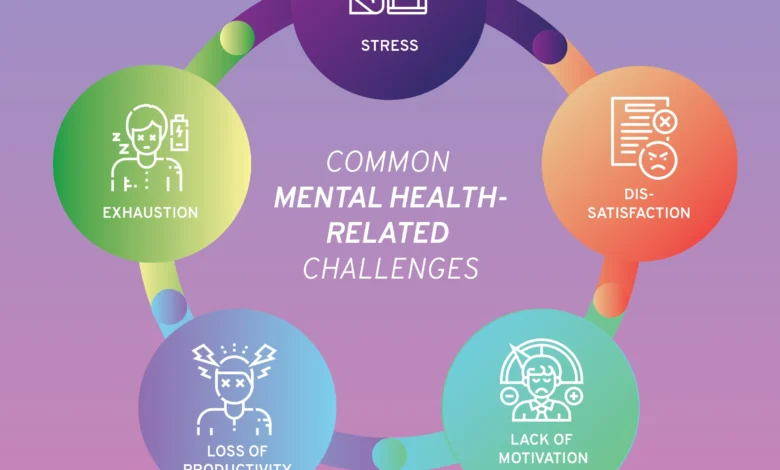When the Mind Reaches Its Breaking Point: Defining a Mental Health Crisis

The mind, like the body, has limits. Stress, anxiety, trauma, and other mental health challenges can accumulate over time, silently eroding a person’s resilience until a breaking point is reached. This breaking point—when the mind can no longer cope with the mounting pressure—defines a mental health crisis. It is a critical juncture where a person’s emotional and psychological well-being becomes severely compromised, often requiring immediate intervention. But what exactly constitutes a mental health crisis? What leads to this state, and how can we recognize and address it?
The Silent Build-Up: How a Crisis Develops
A mental health crisis rarely emerges suddenly. It typically develops over time, fueled by various internal and external stressors. Imagine a glass of water steadily being filled, each drop representing stressors like work demands, relationship struggles, unresolved trauma, or even physical illness. Eventually, the glass overflows, symbolizing the breaking point where the mind can no longer cope.
Several factors contribute to this build-up. For one, modern life is filled with constant demands—financial pressures, social expectations, and the rise of digital connectivity can lead to feelings of being overwhelmed. In addition, personal vulnerabilities, such as genetic predispositions to mental health disorders or childhood trauma, play a significant role in making some individuals more susceptible to crises.
The build-up is often exacerbated by the stigmatization of mental health. Many people, despite feeling the burden of their emotions, fail to seek help. Whether out of fear of judgment, a lack of resources, or a belief that they should “tough it out,” this hesitation allows the pressure to accumulate unchecked.
Signs That a Mental Health Crisis Is Nearing
A mental health crisis is more than just feeling stressed or overwhelmed. It’s a state in which normal coping mechanisms fail, and the individual feels they are losing control over their emotions or thoughts. Some warning signs suggest that someone is nearing this critical juncture:
1. Intense Emotional Distress:
Heightened levels of anxiety, fear, hopelessness, or anger that are difficult to manage are often telltale signs. When these emotions become pervasive and unrelenting, it indicates a mental health decline.
2. Withdrawal from Daily Life:
A person heading toward a mental health crisis may isolate themselves from friends, family, and activities they once enjoyed. This withdrawal can be a coping mechanism to avoid facing emotional pain or external pressures.
3. Erratic Behavior:
Sudden mood swings, impulsive actions, or reckless behavior may be signs of an internal struggle reaching its peak. These actions often serve as cries for help, though they may be misinterpreted as mere misbehavior or irresponsibility.
4. Suicidal Thoughts or Behaviors:
One of the most serious indicators of a mental health crisis is the contemplation of self-harm or suicide. When a person begins to consider ending their life, it’s a sign that the emotional pain they are experiencing feels unbearable.
5. Inability to Focus or Make Decisions:
Cognitive impairments, such as difficulty concentrating or making decisions, can manifest as the mind becomes overwhelmed by emotional stress. Tasks that were once manageable may feel insurmountable.
Causes of a Mental Health Crisis
A mental health crisis can be triggered by a range of factors, often combining to push someone past their coping limits. These triggers vary from person to person, but some common causes include:
1. Traumatic Life Events:
Major life changes, such as the death of a loved one, divorce, or a serious illness, can trigger an emotional upheaval. These events often force individuals to grapple with grief, fear, and uncertainty, which can spiral into a crisis.
2. Chronic Stress:
Long-term exposure to stressors—such as financial struggles, work-related pressures, or caregiving responsibilities—can gradually wear down a person’s emotional resilience. Over time, this stress erodes the individual’s capacity to manage their emotions, leading to burnout or breakdown.
3. Mental Illness:
Underlying mental health conditions, such as depression, anxiety disorders, bipolar disorder, or schizophrenia, can make a person more prone to crises. When these conditions go untreated or are poorly managed, the risk of reaching a breaking point increases.
4. Substance Abuse:
Alcohol and drug abuse can contribute to a mental health crisis, either as a result of dependency or through the exacerbation of underlying mental health issues. Substance use often serves as a way to self-medicate emotional pain, but it ultimately compounds the problem.
5. Isolation:
Loneliness and a lack of support can be significant contributors to mental health decline. Without a strong social network, individuals may feel like they have no one to turn to during difficult times, deepening their sense of hopelessness.
Navigating a Mental Health Crisis: What to Do
Reaching a mental health crisis can feel like the end of the road, but it is important to remember that help is available. Navigating a crisis requires both immediate intervention and long-term strategies to build resilience and promote healing.
1. Seek Immediate Help:
If someone is in immediate danger, especially if they are expressing suicidal thoughts, it is crucial to seek emergency help. This may involve contacting a crisis hotline, visiting an emergency room, or reaching out to a mental health professional for urgent care.
2. Access Professional Support:
Mental health professionals, including therapists, counselors, and psychiatrists, play a key role in helping individuals recover from a crisis. Therapy can provide a safe space to explore emotions, while medication may be necessary to manage underlying mental health conditions.
3. Build a Support Network:
Social support is one of the most critical factors in overcoming a mental health crisis. Friends, family, and support groups offer emotional validation and practical assistance, helping individuals feel less isolated in their struggles.
4. Practice Self-Care:
While self-care alone may not resolve a crisis, it is essential for ongoing mental well-being. Activities such as mindfulness, regular exercise, proper nutrition, and adequate sleep can strengthen mental resilience and reduce the likelihood of future crises.
5. Develop Coping Strategies:
Once the immediate crisis has passed, it’s important to develop healthier ways of coping with stress and emotions. Cognitive-behavioral therapy (CBT), for example, helps individuals reframe negative thought patterns and develop healthier responses to stressors.
Preventing Future Crises
Preventing a mental health crisis involves more than just addressing the symptoms of emotional distress; it requires a holistic approach to mental well-being. Some strategies for prevention include:
Regular Mental Health Check-ins: Just as we check in on our physical health, it’s important to assess our mental health regularly. Being mindful of stress levels, emotional patterns, and personal triggers can help individuals take action before a crisis occurs.
Build Emotional Resilience: Resilience—the ability to bounce back from adversity—is key to preventing mental health crises. This can be cultivated through activities that promote self-awareness, emotional regulation, and problem-solving skills.
Foster Strong Relationships: Building and maintaining healthy relationships provides a buffer against stress. Close connections offer emotional support during tough times and can help individuals navigate challenges more effectively.
Address Mental Health Stigma: One of the most powerful ways to prevent mental health crises is by reducing the stigma around mental health care. Encouraging open conversations about mental health and promoting access to professional support can prevent issues from escalating into crises.
Conclusion
A mental health crisis is a profound, often overwhelming experience, but it is not the end of the road. By recognizing the warning signs, understanding the causes, and seeking appropriate help, individuals can not only navigate through their darkest moments but also build a foundation for lasting mental well-being. Reducing stigma, building resilience, and fostering a culture of support are essential steps in ensuring that when the mind reaches its breaking point, there are ways to heal and recover.





